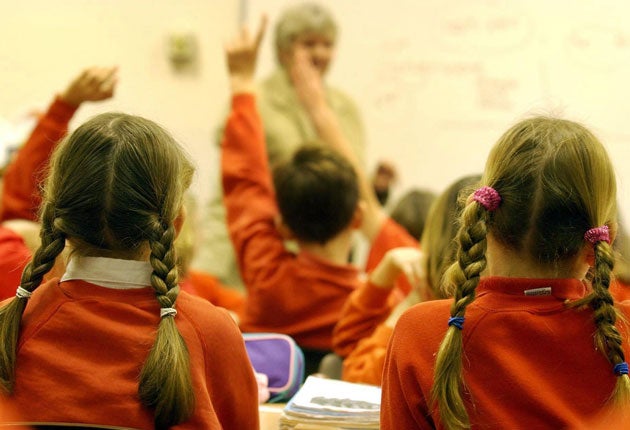Recession and cuts hit thousands of schoolchildren
An increase in pupils and squeezed budgets bring more temporary classrooms and fewer subjects

Your support helps us to tell the story
From reproductive rights to climate change to Big Tech, The Independent is on the ground when the story is developing. Whether it's investigating the financials of Elon Musk's pro-Trump PAC or producing our latest documentary, 'The A Word', which shines a light on the American women fighting for reproductive rights, we know how important it is to parse out the facts from the messaging.
At such a critical moment in US history, we need reporters on the ground. Your donation allows us to keep sending journalists to speak to both sides of the story.
The Independent is trusted by Americans across the entire political spectrum. And unlike many other quality news outlets, we choose not to lock Americans out of our reporting and analysis with paywalls. We believe quality journalism should be available to everyone, paid for by those who can afford it.
Your support makes all the difference.More than 5,000 children face being taught in temporary classrooms this winter as the impact of the recession and the public spending squeeze begins to bite in schools.
The crisis has been caused by a big rise in the school population in London as a result of the recession, with fewer parents being able to afford private schooling for their children or to move out of the city. A boom in the birth rate has also led to a rise in under-fives starting school this term.
Councils in London were given emergency funding from the previous Labour government to help build new schools and permanent classrooms but they say the £140m allocated was inadequate.
The situation is likely to get worse over the next few years as cuts in public spending have already led to the Education Secretary, Michael Gove, cancelling or postponing hundreds of school building projects.
Earlier this summer, he pulled the plug on funding for more than 700 school building or rebuilding projects, sparking anger from both Tory and Lib Dem MPs. One of the most chaotic decisions involved Sandwell, West Midlands, which was initially told nine schools would go ahead before being told 24 hours later they were being scrapped. Yesterday a local councillor, Elaine Costigan, deputy leader of the Conservative group on Sandwell Council, defected to the Labour Party, claiming her community "has been treated with utter contempt" and she was "ashamed to be a Conservative".
The latest estimate from London boroughs is that they could be 28,000 places short by 2014/15, according to figures disclosed today.
"This is quite clearly a problem that won't disappear," said Steve Reed, executive member for children and young people at London Councils – the organisation that represents the capital's 33 borough councils.
"While we are seeing the greatest pressures at primary school level, these kids will be making their way up the years through to secondary schools – and, frankly, we need to do better for them.
"While the current focus is on cuts, this is an area where we need much more investment, not less. The real test of a government is not how much it saves but what it chooses to spend its money on; ensuring a decent start to the education of thousands of young Londoners seems a good place to start."
The figures come as head teachers' leaders warn that some subjects may have to be axed from the curriculum to cope with budget cuts.
Music, design and foreign languages – where the numbers sitting GCSEs plummeted this year – are most at risk.
The Association of School and College Leaders, which represents secondary school heads, is laying on courses for its members to advise them on "managing staff reductions".
Brian Lightman, general secretary of ASCL, said: "Languages in some schools will be vulnerable. We are already worried about them and this could speed up the decline."
Leaders of both the country's head teachers' organisations – Mr Lightman and Russell Hobby, general secretary of the National Association of Head Teachers – do not believe the coalition can deliver on its pledge to protect frontline education services given the scale of cuts envisaged.
They believe that classroom assistants' jobs – expanded under Labour – could be particularly vulnerable.
Subscribe to Independent Premium to bookmark this article
Want to bookmark your favourite articles and stories to read or reference later? Start your Independent Premium subscription today.
Join our commenting forum
Join thought-provoking conversations, follow other Independent readers and see their replies
Comments